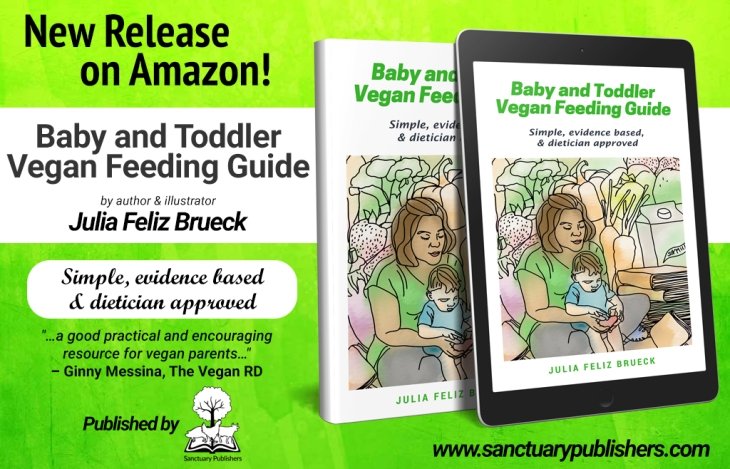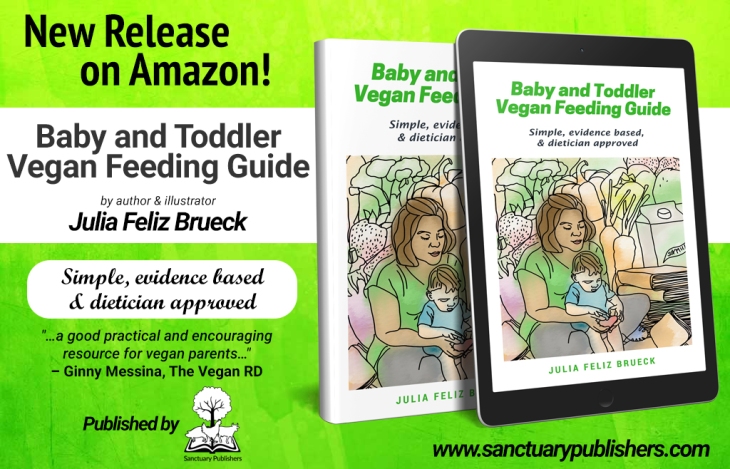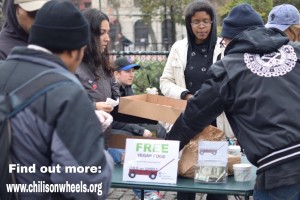A Vegans-of-Color Community Project
New Release Out Now!
Get your Paperback or eBook copy HERE.
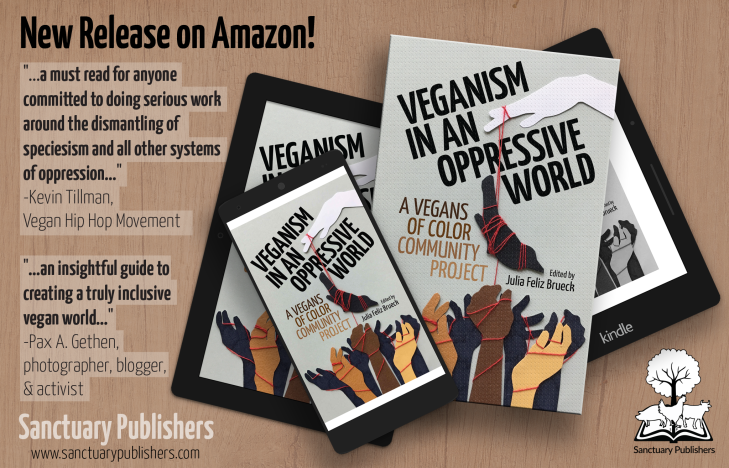
What would it take to raise the voices of nonhumans and spread veganism further than ever before?
Veganism in an Oppressive World, a Vegans-of-Color Community Project edited by Julia Feliz Brueck will revolutionize the way you see our movement. A must read for new vegans and seasoned nonhuman animal activists alike, this community-led effort provides in-depth, first-hand accounts and analyses of what is needed to broaden the scope of veganism beyond its current status as a fringe or “single-issue” movement while ensuring that justice for nonhumans remains its central focus.
—
Veganism in an Oppressive World is…
“…a must read for anyone committed to doing serious work around the dismantling of speciesism and all other systems of oppression…” –Kevin Tillman, Vegan Hip Hop Movement
“…an insightful guide to creating a truly inclusive vegan world.” – Pax Ahimsa Gethen, photographer, writer, & activist
&
“…moves beyond cosmetic diversity and into the realm of complex discussions about intersectionality and consistent anti-oppression within veganism. These…timely essays…provide relief against the danger of it being co-opted by the very status quo it sought to decenter.
– Dr. A. Breeze Harper, author, speaker, & critical race theorist
—
From conception, art, and prose to design, editing, and publication, Veganism in an Oppressive World is an international vegans of color community book project.
From start to finish, in an attempt to raise the voices of nonhuman animals higher than before, the following writers and artists give readers the tools and guidance needed to spread the AR/vegan movement father than its current reach:
Contributors
Bipasha Ahmed is an activist and works as an academic psychologist with interests in inequalities research, particularly in relation to PoC communities. She is also a trustee of a South Asian womxn’s domestic violence service and has been involved in activism in relation to Violence Against Womxn and Girls (VAWG) and anti-racism for many years. She lives in London, England with her two daughters and partner.
Michelle Carrera is a professional translator, writer, and founding director of the vegan non-profit Chilis on Wheels, an organization that helps to provide people in need with warm vegan meals via chapters across the US and in Puerto Rico.
Website: www.chilisonwheels.org
Julia Feliz Brueck is a decade-long vegan of color from Puerto Rico. She is the author of the first ever vegan-themed board book, Libby Finds Vegan Sanctuary, and most recently, the Baby and Toddler Feeding Guide, a dietitian approved evidence based guide for raising young ones on plant based diets safely and simply. Julia is also a published book and magazine illustrator, as well as a research scientist (B.Sc. & M.Sc.), and a mom of two dedicated to standing up against all oppression and to raising the voices of nonhuman animals.
Website: www.juliafeliz.com
Rama Ganesan lived in Chennai India until the age of 10 when she emigrated to the UK with her family. She graduated from the University of Oxford, and then got a PhD from the University of Wales. She then moved to the US with her spouse, and she has lived there ever since. She has two grown children, and a dog and two cat companions at home. Rama became a vegan after reading “Eating Animals” by Jonathan Safran Foer, set as college reading for her son. She then began to work to promote veganism, and currently works as field educator for Ethical Choices Program, where she presents to thousands of students on the topic of compassionate eating choices.
Shazia Juna was born in Reading, England (UK). She has lived in both Pakistan and England during her childhood. Shazia began her scientific career as a laboratory technician in the chemical industry for a few years prior to studying for her undergraduate degree in Chemistry at University of York, UK. Shazia worked as a Development Chemist in the paint and printing ink sector for a few years and later, returned to academia and completed her MPhil (Organic Chemistry) at Bath University, UK, as well as her PhD (starch/natural materials) at Glyndwr University in North Wales, UK. Shazia worked as a postdoctoral researcher for over three years at Karl-Franzens University, Graz, Austria. Throughout her scientific career, she has been interested in renewable materials. Shazia currently lives in Vienna, Austria and is learning to draw and paint with a goal of exploring her scientific works through an artistic lens. Shazia also has a keen interest in the use of vegan art materials that are commercially available or homemade. She is also working on fiction novels based on the ecology and chemistry of trees/flora and has been travelling across Europe. Shazia has been a vegetarian since she was 18 and a vegan since August 2009.
Website: www.shaziajuna.com
Melissa John-Charles Carrillo has been vegan since 2001 and is passionate about wildlife, works with refugees, and writes about being a person of colour in a mostly white society.
Website: http://livingincolour651.wordpress.com
Vinamarata “Winnie” Kaur is a Ph.D. candidate in English and Comparative Literature at the University of Cincinnati (UC), Cincinnati, Ohio, United States with research and activism interests in Sikh studies, South Asian studies, feminist theories, critical human-animal studies, digital scholarship, and film and media studies. She teaches courses on writing, feminism, and film, media, and sexuality studies and offers writing assistance as a tutor to UC Health’s and Cincinnati Children’s Hospital Medical Center’s medical professionals and UC’s undergraduate and graduate students. During her spare time, she enjoys offering online and in-person advice to those looking to transition to veganism, reading recent peer-reviewed medical research (human and veterinary), hiking with her canine companion, playing wand and light toy games with her feline friend, and exploring new vegan cuisines with her partner.
Website: www.winniekaur.com
Laila Kassam has a MSc in Development Management from the London School of Economics and a PhD in Development Economics from the School of Oriental and African Studies, University of London. She has worked in the international development sector since 2003. Her work has focused on conducting research related to poverty and food security for rural development projects in sub-Saharan Africa and South Asia. Her research has been published in peer reviewed journals and by international organizations including the Food and Agriculture Organization of the UN. She became vegan in 2013 and co-founded the Veterinary Vegan Network with her partner Shailen Jasani, a vegan veterinary surgeon, in 2015.
Website: www.everyday-justice.com
Deepta Rao has an M.A. in Experiential Health and Healing from The Graduate Institute, Bethany, Connecticut, United States and an M.B.A. in Marketing from Institute of Technology and Management, Chennai, Tamil Nadu, India. She also has a Plant-Based Nutrition Certificate from The T. Colin Campbell Center for Nutritional Studies and eCornell. If she is not volunteering at her kids’ school, she is digging into the neural networks of neurodevelopmental and neurodegenerative disorders. She is also a student of the Chinmaya Mission San Jose and volunteers at the mission during weekends. Besides feeding her family delicious vegan food, she loves making beaded bracelets and elaborate travel plans.
Meneka Repka is an artist and teacher living in Calgary, Alberta. She completed a BFA from ACAD in 2007, and a BEd from the University of Lethbridge in 2010. After teaching junior high and high school, Meneka became interested in expanding her knowledge in art education, and finished an MA from Concordia University (Montreal) in 2013. She recently finished a PhD in education at the University of Calgary. Meneka loves teaching, and feels just as engaged in her teaching practice as she does in her art practice. As an illustrator, Meneka is interested in the animal, links between humans and nonhumans, nature, and environment. In her work, she investigates the complicated relationships between humans and other animals.
Website: http://meneka.carbonmade.com
Margaret Robinson is a bisexual and two-spirit scholar from Eski’kewaq, Nova Scotia, and a member of the Lennox Island First Nation. A community-based researcher since 2009, her work examines the impact of intersecting oppressions and draws on critical, postcolonial, and queer theories, intersectionality, and third wave feminism.
Website: http://www.dal.ca/faculty/arts/sociology-social-anthropology/faculty-staff/our-faculty/margaret-robinson.html
Saryta Rodriguez is an author, editor, social justice advocate, and educator. Their first book, Until Every Animal is Free, was published in 2015, and they are currently working on a compilation of essays examining food justice from a variety of lenses. Saryta’s past writings have focused on food justice, veganism, race, and gentrification. Their articles have appeared on such notable social justice websites as Free From Harm, Causa Justa/Just Cause, and Reasonable Vegan. Saryta edits manuscripts of all genres, having worked previously for David Black Literary Agency (Brooklyn) and Penguin Publishing (Manhattan) and currently editing for Sanctuary Publishers. They also specialize in literacy tutoring for students in Grades K-12. Originally from Bay Shore, New York, Saryta currently resides in Harlem.
Website: http://www.sarytarodriguez.com
Danae Silva Montiel is a two decade-long vegan currently working as a graphic designer and illustrator.
Meenal Upadhyay is a software developer and a corporate trainer, although she would rather be a movie reviewer fulfilling two of her favorite pastimes—watching movies and writing. She loves writing about feminist issues. When she is not “mothering” her two daughters, she teaches coding to little kids.
Rayven Whitaker is a 9th grade Home-Schooled Student, who chose to go vegan in March of this year after attending her second Triangle VegFest. She has been the co-host and co-producer of numerous Podcasts (dating back to 2012 at the earliest). She is looking forward to the continuing pursuits of her interests in (Music (composing, producing, singing and songwriting), Dance (as well as choreographing), Film (screenwriting, cinematography, directing, producing and acting), Photography, Writing, Journalism, etc.) and outside of the Arts.
Destiny Whitaker is an 11th grade Home-Schooled Student with a passion for arts and music. Her many titles include: Musician, Arranger, Writer, Podcaster, Producer, Actress, Graphic Designer, Photographer, Activist, Journalist, Fangirl and much more.
Websites: www.DestinyWhitakerProductions.Weebly.com & www.OurWorldAndFandomsGalore.com
Ankita Yadav is a research scholar at Jawaharlal Nehru University, New Delhi, India and her areas of specialization include human-animal studies, interconnectivity of oppressions, and gender. She has published various scholarly and animal welfare related articles. She is a vegan, an animal welfare activist, and a leading blogger about cats in Delhi. She has pioneered a community effort project, based purely on volunteer engagement and local resources, to rescue, rehabilitate, and save from suffering and superstition, more than 750 cats (and counting) in the city. In 2016, TEDx Delhi recognized her as a Superhero of Delhi. When Ankita is not writing or rescuing cats, you would find her experimenting with funky earrings and lip colors and having interactive sessions with people where she educates them about veganism and animal welfare policies.
Website: https://www.facebook.com/everythingmeow.india/
—
Grant Support from: http://www.deutscher-jugendschutz-verband.de
Paperback & eBook available HERE.
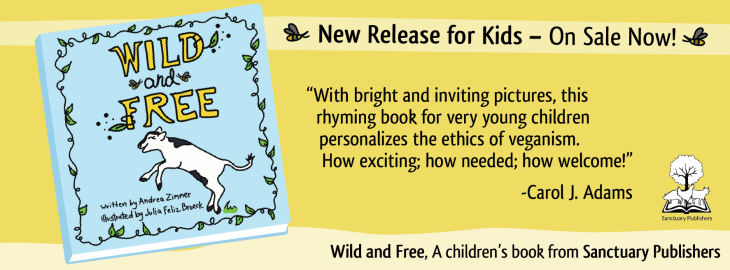

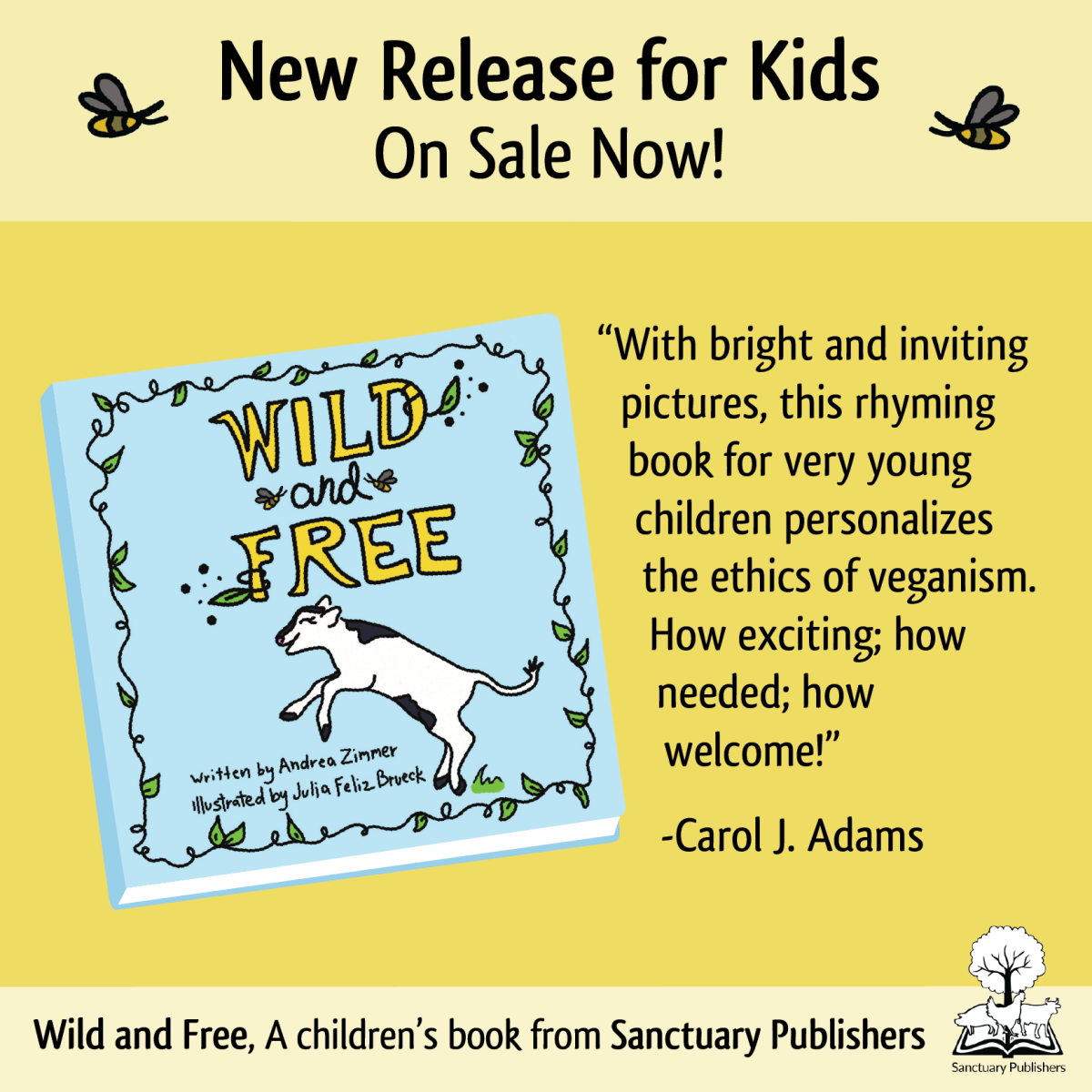
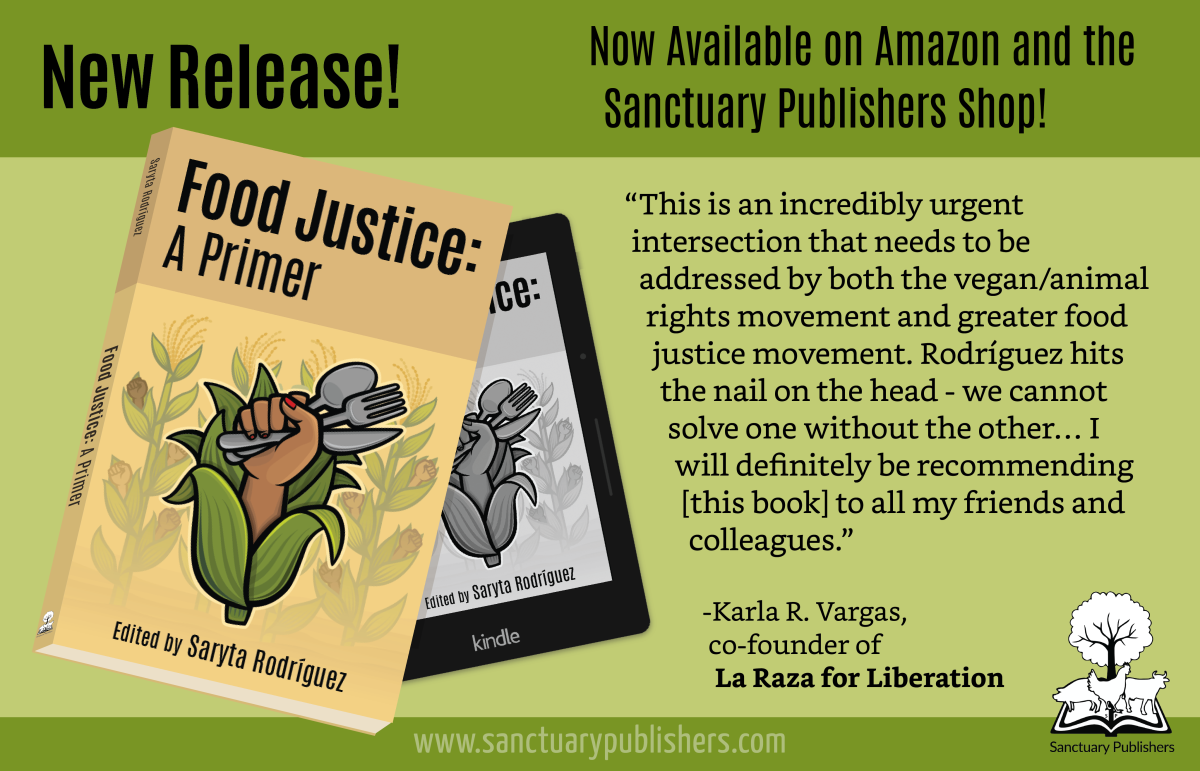

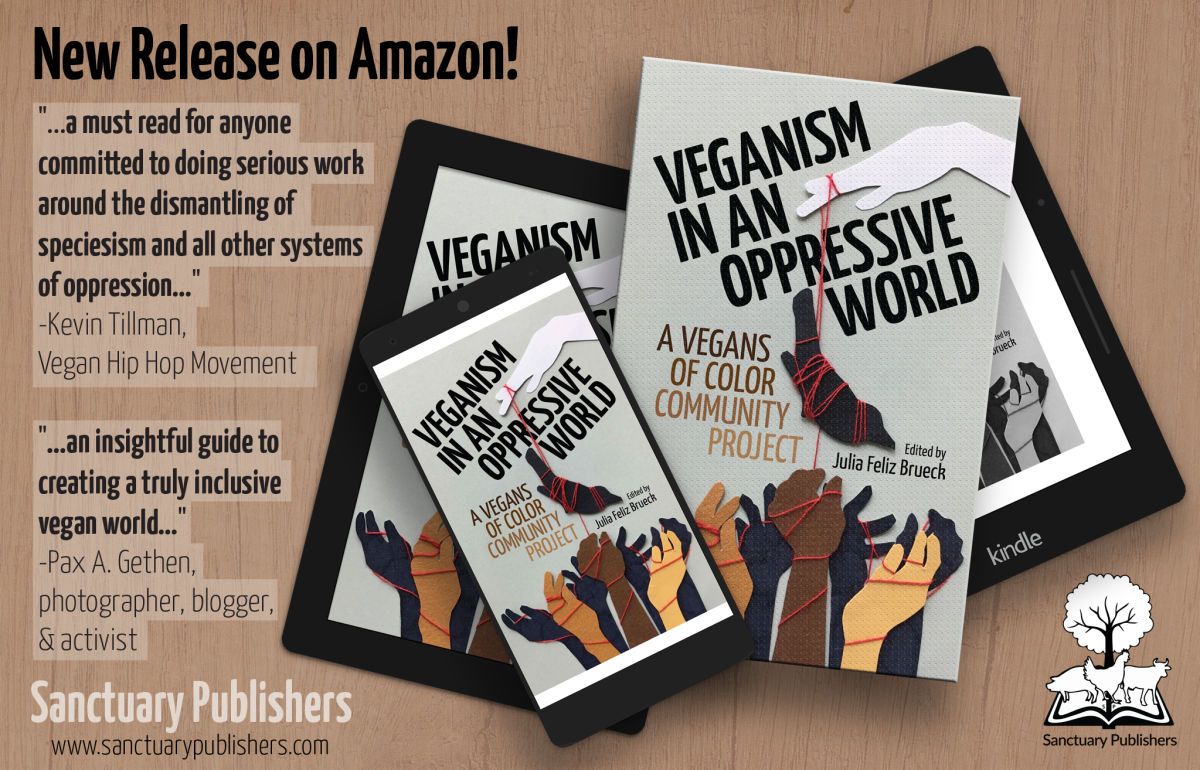




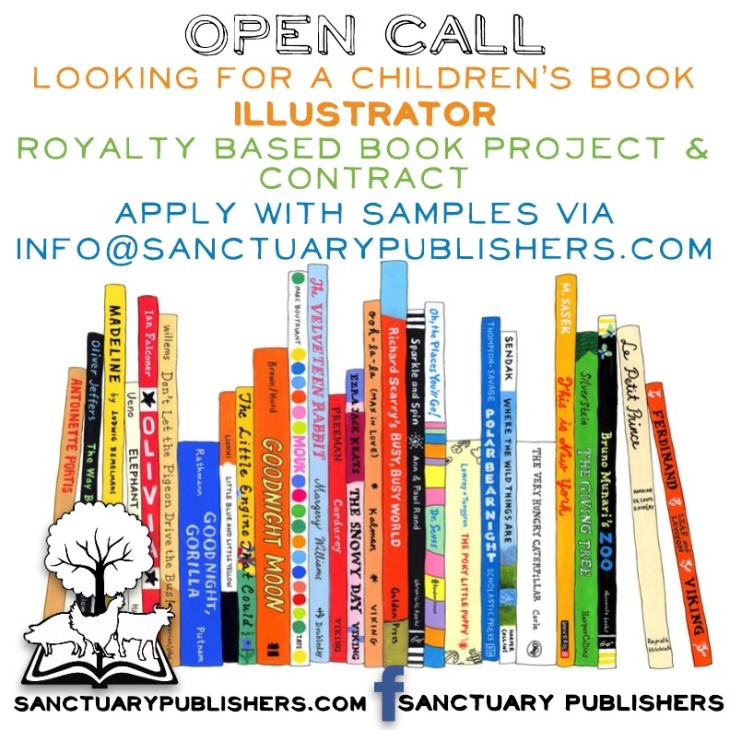








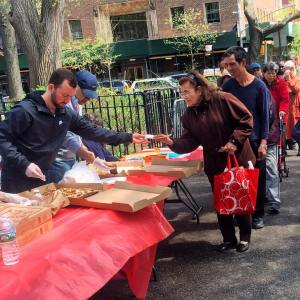
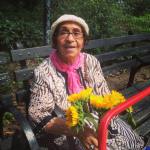 Maria, is a 96-year-old woman from Puerto Rico, who I have adopted as my grandmother. She walks close to a mile every week to see us. She has come to a period in her life, where she has no one else to count on, except her grandson who visits her about once a month. In the meantime, she has us every Saturday to talk to, to laugh with, to complain to, or joke with. We have given her our phone numbers so she knows she can call us if she ever needs anything. She came to us very depressed and lonely, and we have seen her flourish since, making jokes and being saucy. Chilis on Wheels is so much more than just a meal.
Maria, is a 96-year-old woman from Puerto Rico, who I have adopted as my grandmother. She walks close to a mile every week to see us. She has come to a period in her life, where she has no one else to count on, except her grandson who visits her about once a month. In the meantime, she has us every Saturday to talk to, to laugh with, to complain to, or joke with. We have given her our phone numbers so she knows she can call us if she ever needs anything. She came to us very depressed and lonely, and we have seen her flourish since, making jokes and being saucy. Chilis on Wheels is so much more than just a meal. Michelle Thiele, now our NYC Chapter Director, a vegan mom to Jamie, one of our youngest volunteers who started helping us out when he was just 2 years old, comes week after week, stores food, cooks it, transports it, seeks out donations, coordinates volunteers, always with such a warmth! Her husband, Jeff, also helps us out every week with his permanent kind smile and solid support. Natassia comes in every week always willing and ready to help in whatever is needed. Christian, our Director of Chapter Development, our Renaissance Man, does a bit of everything, from shoveling snow to helping install solar panels in TheVTeamTour van, to cooking, to drumming up donations, to staying in touch with new chapters. Blake is our favorite babysitter and rule enforcer. And Jimmy, who came to us referred to by a social service agency two years ago. Jimmy is a young vegan; he was going through some hardships and found himself without a place to live, and looking for meals without animal products in the soup kitchens and shelters. Thankfully a social service agency connected us, and Jimmy came in one rainy afternoon. He instantly fit in with our volunteers, and he started coming weekly, having a meal with us and helping us to set up, and serve. Eventually he heard of a job opening in the Parks Dept. in NYC, and he applied, putting in his experience working with us, and including as a reference. He got the job, and has worked with them since. And he still finds time to volunteer with us most weeks. He is our Chilis on Wheels family, where we come together to care for ourselves and our community.
Michelle Thiele, now our NYC Chapter Director, a vegan mom to Jamie, one of our youngest volunteers who started helping us out when he was just 2 years old, comes week after week, stores food, cooks it, transports it, seeks out donations, coordinates volunteers, always with such a warmth! Her husband, Jeff, also helps us out every week with his permanent kind smile and solid support. Natassia comes in every week always willing and ready to help in whatever is needed. Christian, our Director of Chapter Development, our Renaissance Man, does a bit of everything, from shoveling snow to helping install solar panels in TheVTeamTour van, to cooking, to drumming up donations, to staying in touch with new chapters. Blake is our favorite babysitter and rule enforcer. And Jimmy, who came to us referred to by a social service agency two years ago. Jimmy is a young vegan; he was going through some hardships and found himself without a place to live, and looking for meals without animal products in the soup kitchens and shelters. Thankfully a social service agency connected us, and Jimmy came in one rainy afternoon. He instantly fit in with our volunteers, and he started coming weekly, having a meal with us and helping us to set up, and serve. Eventually he heard of a job opening in the Parks Dept. in NYC, and he applied, putting in his experience working with us, and including as a reference. He got the job, and has worked with them since. And he still finds time to volunteer with us most weeks. He is our Chilis on Wheels family, where we come together to care for ourselves and our community.